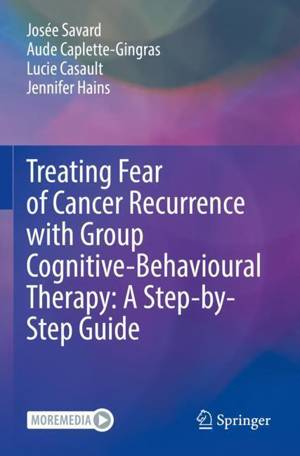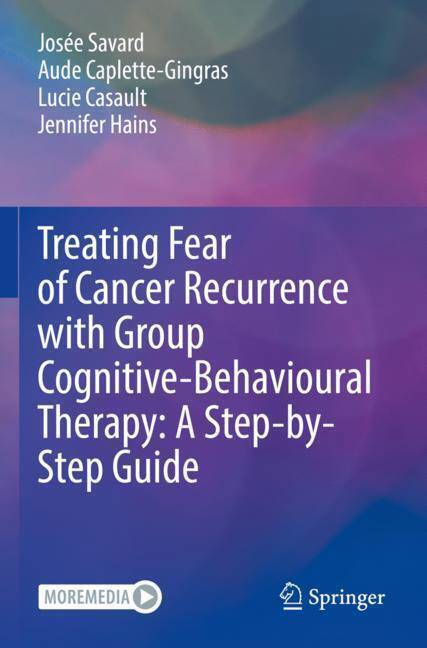
- Retrait gratuit dans votre magasin Club
- 7.000.000 titres dans notre catalogue
- Payer en toute sécurité
- Toujours un magasin près de chez vous
- Retrait gratuit dans votre magasin Club
- 7.000.000 titres dans notre catalogue
- Payer en toute sécurité
- Toujours un magasin près de chez vous
Treating Fear of Cancer Recurrence with Group Cognitive-Behavioural Therapy: A Step-By-Step Guide
Josée Savard, Aude Caplette-Gingras, Lucie Casault, Jennifer HainsDescription
Cancer is the leading cause of death in the United States. The improvement of screening procedures and treatments have led to higher survival rates, and consequently to an increased number of individuals who fear that their cancer might come back.
Fear of cancer recurrence (FCR) is defined as the fear, worry, or concern that cancer may come back or progress. FCR has been found to be the number one unmet need of cancer survivors. High levels of FCR are associated with greater psychological distress, impaired functioning, decreased quality of life, and increased medical consultations, psychotropic usage and health-care costs. It is therefore crucial to offer these patients an appropriate and effective treatment. The books first propose a theoretical model of FCR that identifies the five main targets of intervention in this program: 1) cognitive interpretation; 2) behavioural avoidance; 3) cognitive avoidance; 4) reassurance and control seeking; 5) intolerance of uncertainty. Then, each target is discussed and specific cognitive-behavioural therapy strategies are suggested that focus on each of them based on the best available empirical evidence for the treatment of anxiety disorders (e.g., generalized anxiety disorder) and cancer-related anxiety.
This book will be of interest to clinicians working with cancer patients such as psychologists and other health care providers as well as cancer patients and survivors. Graduate students in clinical health psychology, and connecting disciplines such as psycho-oncology, psychiatry, nursing, social work, rehabilitation, spiritual care, and sexology might also find this text of value.
Spécifications
Parties prenantes
- Auteur(s) :
- Editeur:
Contenu
- Nombre de pages :
- 253
- Langue:
- Anglais
Caractéristiques
- EAN:
- 9783031071898
- Date de parution :
- 03-12-23
- Format:
- Livre broché
- Format numérique:
- Trade paperback (VS)
- Dimensions :
- 156 mm x 234 mm
- Poids :
- 385 g







